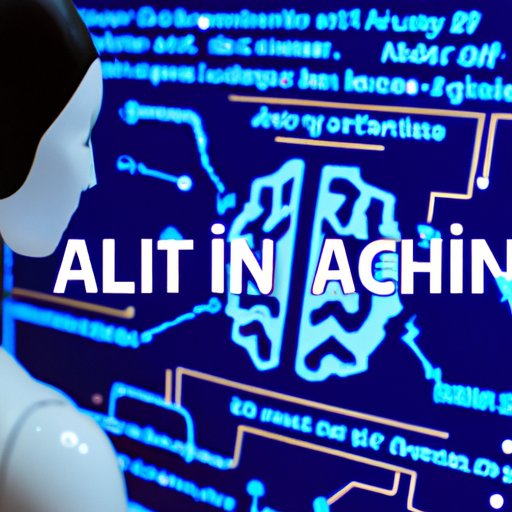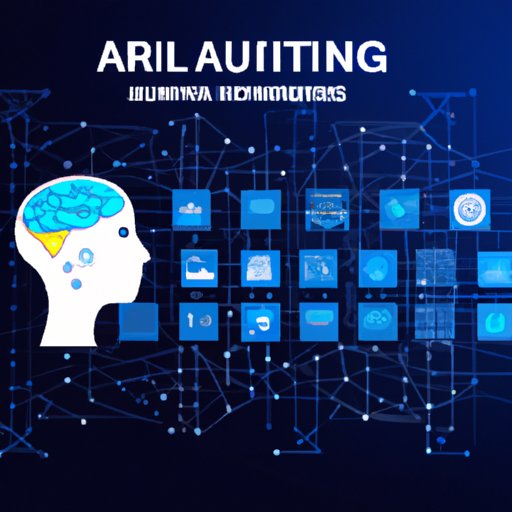Introduction
Artificial Intelligence (AI) has been a topic of great interest to scientists, researchers, and the general public alike. It has long been a source of fascination, with many speculating about its capabilities and potential applications. One of the most pressing questions is whether or not AI can learn. This article will explore this question, examining the potential of machine learning in AI, the benefits and challenges of training AI, and how AI is changing the way we learn.
Exploring the Possibilities: Can Artificial Intelligence Learn?
The potential of AI to learn is a hotly debated topic. While some believe that AI has the potential to learn from its environment and experiences, others are more skeptical. In order to fully understand the possibilities, it is important to examine the potential of machine learning in AI.
Machine learning is a subfield of AI that focuses on the development of computer programs that can “learn” from data. These programs are designed to identify patterns in data and use them to make predictions and decisions. Machine learning algorithms are often used in AI applications such as image recognition, natural language processing, and autonomous vehicles.
The idea of machine learning has been around since the 1950s, but it has only recently become a viable option for AI systems. As technology advances, machine learning algorithms are becoming increasingly powerful and accurate, allowing AI systems to learn from their environment and experiences.
However, while machine learning offers great promise, there are also challenges associated with training AI. For example, AI systems require large amounts of data in order to learn effectively, and they must be able to process this data quickly and accurately. Additionally, AI systems must be trained carefully in order to prevent bias and ensure accuracy.

How AI is Changing The Way We Learn
In addition to exploring the potential of AI to learn, it is also important to consider how AI is changing the way we learn. AI has already had a significant impact on education, and this trend is likely to continue in the future.
One of the most notable changes is the emergence of adaptive learning technologies. Adaptive learning technologies employ AI algorithms to tailor instruction to individual students, providing personalized learning experiences that are tailored to the student’s needs and abilities. This type of technology has the potential to revolutionize the way we learn, making education more accessible and efficient.
Another key factor to consider is the role of human instructors in teaching AI. While AI systems can learn from data, they still need guidance and instruction from humans in order to reach their full potential. Human instructors play an important role in teaching AI, as they can provide valuable insight into the process of learning and help AI systems to avoid mistakes.
Evaluating the Impact of AI on Cognitive Development
Finally, it is important to consider the impact of AI on cognitive development. AI has the potential to improve our ability to think and reason, as well as our capacity to remember and learn new information. However, there are potential pitfalls associated with the use of AI in cognitive development.
For example, AI systems may lead to over-reliance on technology, reducing our ability to think critically and solve problems independently. Additionally, AI systems can introduce bias and incorrect assumptions into decision-making processes, leading to unfair outcomes and skewed results. For these reasons, it is important to carefully evaluate the potential benefits and pitfalls of AI before incorporating it into cognitive development.
Conclusion
In conclusion, this article has explored the question of whether or not AI can learn. We have examined the potential of machine learning in AI, the benefits and challenges of training AI, and how AI is changing the way we learn. We have also evaluated the impact of AI on cognitive development, examining the potential benefits and pitfalls of AI. Through this exploration, it is clear that AI has the potential to learn, with numerous benefits and challenges associated with its use.
These findings have important implications for further research, as it is essential to continue to monitor the progress of AI and evaluate its impact on cognitive development. With careful consideration and monitoring, AI has the potential to revolutionize the way we learn and think, opening up new possibilities for education and cognitive development.
(Note: Is this article not meeting your expectations? Do you have knowledge or insights to share? Unlock new opportunities and expand your reach by joining our authors team. Click Registration to join us and share your expertise with our readers.)
